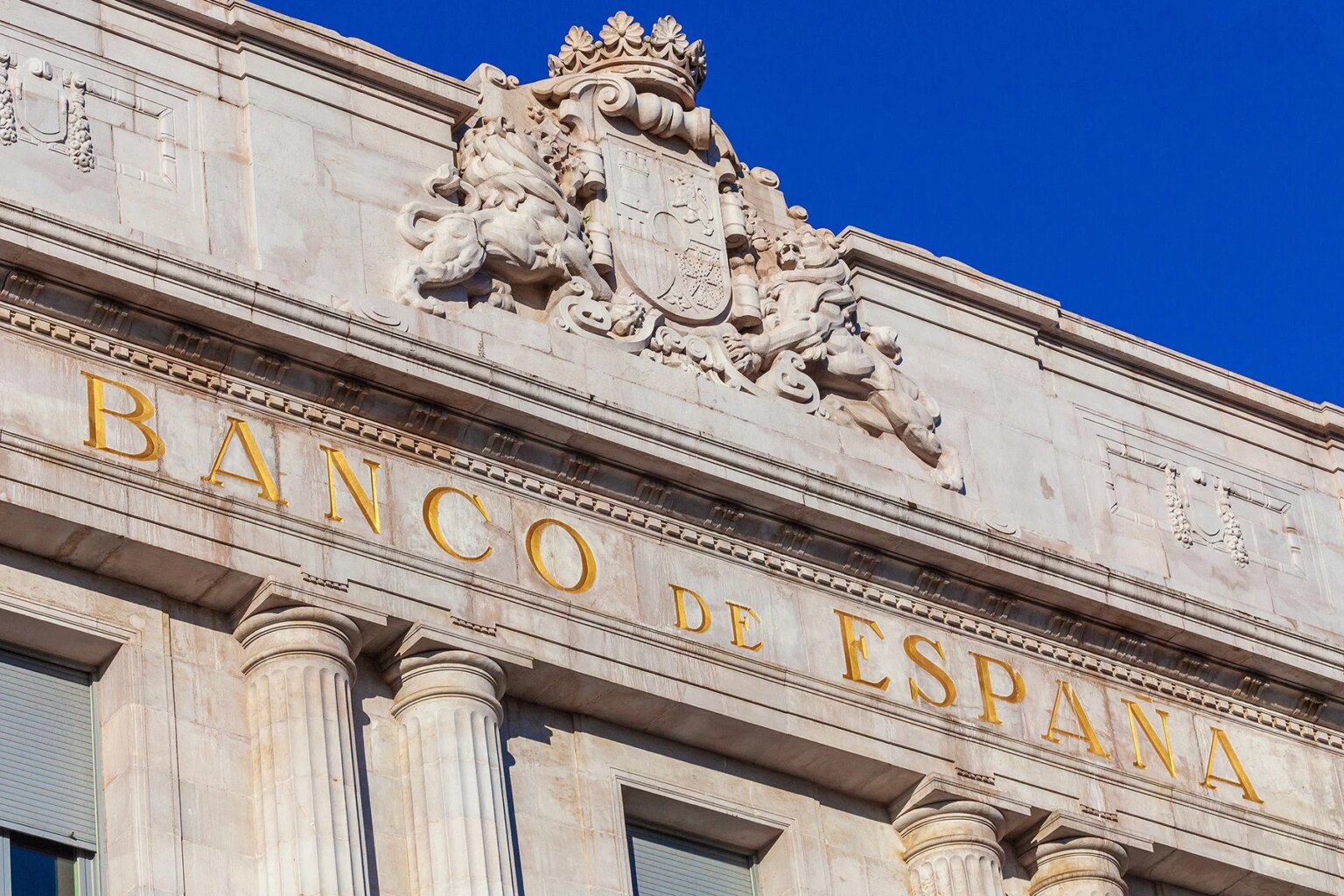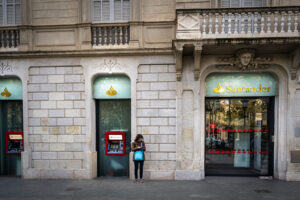Spain has a sizable English-speaking expat community and there are many banks in Spain that cater to the needs of foreigners, with processes for opening and managing an account easier than in many other European countries. This guide looks at all the key points of banking in Spain, including:
- The banking system in Spain
- Currency in Spain
- Banks in Spain
- Banking services in Spain
- Opening a bank account in Spain
- Payment methods in Spain
- Bank fees in Spain
- Offshore banking in Spain
- Payment security and fraud in Spain
- Making a complaint about banks in Spain
- Alternatives to using banks in Spain
- Useful resources
The banking system in Spain
The Spanish banking system is fully integrated with the international financial market and there is a variety of banks to choose from, including private, state-owned, international, cooperative, and mobile banks in Spain.
The banking industry in Spain, which had expanded significantly early in the 21st century, has shrunk since the 2008 housing crisis, with many regional savings banks either closing or merging with other banks.
According to current statistics, there are 141 banks in Spain (including around 80 foreign banks), plus 67 cooperative banks and 19 savings banks. These run services from over 27,000 branches across the country. The Spanish central banking authority is Banco de España, which also serves as the national regulator of banking in Spain.
Currency in Spain
Spain is a member of the Eurozone and uses the euro (€) along with other Eurozone countries. The current exchange rate of the euro (June 2019) is 1.12 against the GBP and 0.88 against the US$. There are eight different Euro coins in use (1, 2, 5, 10, 20, and 50 cents plus 1 and 2 euros) and seven different notes (5, 10, 20, 50, 100, 200, and 500 euros). Smaller stores in Spain will often not accept notes above €100.

Cash machines and ATMs in Spain
For major cards such as Visa, Mastercard, and Maestro, you won’t have any trouble finding an ATM in the main Spanish towns and cities, although in rural areas they are more few and far between. Most machines also take Amex cards.
For less commonly used cards, it’s best to check with your provider about availability before traveling to Spain. You can find your nearest machine using locators for Visa, Mastercard, Maestro, Amex, and Discover.
Withdrawal limits at many Spanish ATMs are usually around €300 a day. If you’re using a foreign debit, credit or cash card, you may have to pay withdrawal fees which can range from around 50 cents to around €3 per withdrawal.
Banks in Spain
National banks
Spain has a number of big national banks (bancos), including banks that operate in other countries. The bigger banks in expat-populated cities are likely to have English-speaking services tailored towards the needs of expats. The normal opening hours for banks in Spain are from 08:30-14:30.
The main Spanish banks are:
- Banco de Sabadell
- Banco Santander
- Bankia
- BBVA
- Caixabank
Regional banks
There are also many smaller regional banks (cajas) in Spain. These are mostly state-owned or cooperatives and operate mainly as savings banks. These banks don’t offer the same range of services as bancos and other types of banks in Spain and are less likely to have English-speaking services. Many of the smaller cajas have closed down or merged with larger organizations since the financial crisis of 2008.
International banks
You can find several big-name multinational banks in Spain which have branches in major cities and towns. These banks have similar opening hours as Spanish banks and will normally offer a range of expat-friendly services. Some of the biggest international banks in Spain are:
- Barclays
- Citibank
- Deutsche Bank
- HSBC
- ING
Online banks
Spanish residents can also choose to open an account with an online or mobile provider that gives them greater access to their account and access to services at a low cost. Available online banks in Spain include:
Banking services in Spain
Services provided by banks in Spain vary across different providers, but the following can be found:
- Current accounts – banks in Spain offer various different current account deals for the day-to-day management of finances, including credit and debit card options.
- Loans and overdrafts – lending options are available through many Spanish banks for things such as vehicle purchases, home renovations or payroll advances.
- Mortgages – many of the main banks offer variable and fixed-rate Spanish mortgage options for customers who meet the criteria.
- Savings and investments – you can find options including investment funds, pensions plans, and stock exchange investment with several banks.
- Insurance – some banks provide insurance options for Spain including life insurance, home insurance, and Spanish health insurance.
- Digital and online banking – most bigger national and international banks in Spain now offer internet banking options to make it easier for customers to manage their finances remotely.
- Mobile banking – many banks that offer digital services now also offer mobile banking in Spain as well as mobile payment services through banking apps.
- Business banking – as well as services for individuals, banks in Spain offer a range of accounting, borrowing, investment, and insurance options for Spanish businesses and autónomos.
- Expat services – international banks and bigger national banks in Spain offer English-speaking services as well as packages tailored towards expats such as international money transfer options and non-resident account.
Opening a bank account in Spain
You can open up an account with most main banks in Spain either before you move or once you arrive in the country. To open an account before you move, you have to do so as a non-resident and set up a non-resident account. For this, you may need to provide a certificate of non-residency.
Other documents required when opening up a bank account in Spain are proof of ID (e.g., passport), proof of address, plus your Spanish NIE number if you are a resident. Accounts are usually opened with five working days and bank cards sent out within two weeks. See the Expatica guide to opening a bank account in Spain for more information.
Payment methods in Spain
Cash
While other forms of payment are available and widely used, cash is still the most frequent type of payment used in Spain and some smaller businesses, especially in more rural areas, will still only take cash. Cash is predominantly used for small transactions below €10-15.
Checks
Checks in Spain are still accepted by most businesses but they are seldom used and banks no longer issue checkbooks as a standard payment method.
Debit cards
Debit cards are a popular form of payment in Spain, with around 85% of the population carrying at least one debit or credit card. Around 43% of online payments in Spain were made with a debit or credit card in 2018.
The most common form of debit cards in Spain are Visa and Mastercard. Most stores accept them using chip and PIN technology. Contactless payments are growing in frequency, although there is a payment limit currently set at €20. You will usually receive a debit card when you open a Spanish bank account.
Credit cards
Credit cards are more popular than debit cards in Spain. According to the Banco de Espana, there were nearly 50 million credit cards in circulation in Spain in 2017, compared to nearly 26 million debit cards.
Visa is the most popular type of credit card in Spain, followed by Mastercard and American Express.
Most banks in Spain offer credit cards with their accounts. You need to apply for the card either when you open the account or any time afterwards. Alternatively, you can order cards directly from Visa or Mastercard but will need to link them to a current account. You will usually have a spending limit and will need to pay bills periodically (usually monthly or quarterly).
Most banks will charge fees (e.g., an annual fee) for credit cards, although some do offer free cards when opening certain types of accounts.
Direct debits and standing orders
Direct debits (domiciliación de recibos) and standing orders (domiciliación de pago) are commonly used in Spain for payment of bills such as utility payments and municipal taxes.
These payments are similar; the difference is that a standing order is an instruction to your bank to pay a fixed amount to another account. On the other hand, a direct debit is a granting of permission to another company/party to take a regular (often varying) payment from your account.
It is easy to set up direct debits or standing orders in Spain and it is usually free of charge. Under Spanish law, you have 30 days to cancel any direct debit issued to your account. This can be done by contacting your bank.
Online and mobile payments
Online and mobile payments in Spain have been picking up speed, with most banks and providers offering digital payment services and mobile apps. PayPal is also widely used and was the most popular payment method for online payments in Spain in 2017.
With smartphone use predicted to reach nearly 73% of the population by 2021, mobile payments are likely to continue to grow in popularity. Popular mobile payment providers in Spain include Bizum, Apply Pay, Samsung Pay, and Google Pay.
International money transfers
You can transfer money to overseas accounts from banks in Spain if you have the IBAN (international bank account number) and BIC (bank identificier code) numbers for the recipient, although this can result in fees from both banks. Countries within the EU/EFTA can make SEPA (Single Euro Payment Area) transfers between countries which are easier, faster and cheaper. SEPA transfers take around 1-2 working days, with international transfers outside the EU usually taking around 3-5 days.
For international money transfers, there are solutions that could prove cheaper and more convenient, such as:
See Expatica’s guide to international money transfers for more information.
Bank fees in Spain
Most current accounts in Spain incur annual fees that are usually around €15–20, although it’s worth shopping around as some banks offer deals as well as cheaper accounts for the likes of students or pensioners. Other banking costs vary between different providers so it’s worth checking upfront and asking for a list of fees before opening an account if it’s not already provided.
Debit cards can cost around €12–15 a year while credit cards vary from being free to over €30 a year plus APRC (annual percentage rate charge). Costs for loans and mortgages from Spanish banks will usually depend on the APRC, plus there may be additional charges.
International money transfers are usually in the range of €3-15 for amounts less than €50,000. Transferring larger amounts can be €30 or more. ATM use at the larger international banks is usually free although there may be a charge (usually less than €3) if you use foreign cards or withdraw foreign currency from a Spanish cash machine.
Some Spanish banks, especially smaller local banks, may charge other customers to use their ATMs. Make sure you select the option to carry out the transaction in English if you’re not sure.
Offshore banking in Spain
Expats in Spain may find that opening an international offshore account is the best way to manage their finances. Having an offshore account is particularly helpful for anyone who works abroad, spends a lot of time in more than one country, or frequently transfers money between countries.
Offshore bank accounts are located outside the holder’s country of residence and usually offer distinct advantages such as a wider range of cross-border services and lower taxation on funds.
Payment security and fraud in Spain
Banking fraud is becoming more of a problem in the digital age. Because of this, banks in Spain are constantly improving their security features, with many mobile accounts now offering ID-recognition and card-blocking features. The most common online frauds in Spain in 2018 were invitations to suspicious websites and phishing emails.
You can help to protect your money against fraud by:
- never click on a link to a bank website in an email. Always type the bank’s full website into the address bar;
- never giving sensitive or confidential information out by email or over the phone;
- making online payments only using a secure payment platform;
- never enter your PIN number anywhere on a website;
- never store personal data on your mobile device
Lost or stolen bank cards in Spain
If your bank or credit card is lost or stolen in Spain, you should:
- contact your bank or card provider immediately. Most banks and card providers will have 24-hour lines that you can call in such instances;
- call 902 102 112 to report the incident to an English-speaking helpline. You will then have around 48 hours to ratify the incident at a local police station
See here for a list of important emergency numbers in Spain.
Making a complaint about banks in Spain
If you’re unhappy with the service provided to you by your Spanish bank, you should first try to resolve it through the customer service or complaints department within your bank. If this is unsatisfactory, you can contact the Banco de España, which regulates banking in Spain. Information, contact details, and online forms are available on the bank’s website.
Alternatives to using banks in Spain
Spain has many local credit unions and cooperative savings banks (cajas) providing financial services at low costs, but these are mostly catered towards the local population, particularly among rural communities. The EU banking website has details of cooperative banks and specialized credit institutions currently operating in Spain.
Useful resources
- Banco de España – national bank of Spain and regulator of Spanish banking services






